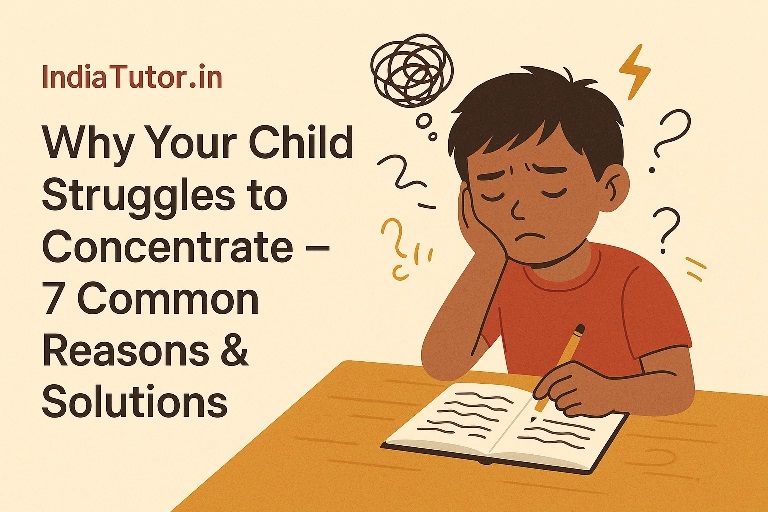Many parents worry when they see their child struggling to focus on studies. In today’s fast-paced world, distractions are everywhere – from buzzing gadgets to overloaded school schedules. Concentration is a skill, and like any skill, it needs to be developed and supported. According to a 2023 UNICEF report, more than 40% of school-aged children in urban India experience difficulty maintaining attention for more than 15 minutes on a single task.
Here are the seven most common reasons why children find it hard to concentrate, along with practical solutions you can start using today.
1. Digital Distractions
Phones, tablets, gaming consoles, and endless videos can reduce attention spans. Studies from the Indian Journal of Pediatrics show that children who spend more than 3 hours a day on screens perform 15% lower on tasks requiring sustained attention compared to peers with limited screen time.
Solution: Create a “no-gadget” study zone. Keep electronic devices away during homework and study sessions. Schedule screen time after academic tasks are completed.
2. Lack of Proper Sleep
Sleep is crucial for brain function. Children aged 6–13 need 9–11 hours of sleep per night. The National Sleep Foundation notes that kids who get less sleep show slower problem-solving abilities and reduced memory retention.
Solution: Set a consistent bedtime. Avoid stimulating activities like video games or intense physical play at least an hour before bed.
3. Poor Nutrition
What children eat directly affects their focus. A diet high in processed sugars and junk food can lead to energy crashes. On the other hand, whole grains, fruits, vegetables, and protein-rich foods improve concentration.
Solution: Include nuts, yogurt, eggs, whole wheat bread, and fresh fruits in daily meals. Ensure they drink enough water to stay hydrated.
4. Overloaded Schedules
Many children are enrolled in multiple classes and activities, leaving them tired and mentally drained. Too much on their plate reduces their ability to focus.
Solution: Review your child’s weekly schedule. Prioritize quality learning time over quantity. Keep at least one or two days lighter to allow rest.
5. Stress and Anxiety
Academic pressure, peer competition, or personal challenges can make it hard for a child to focus. According to a 2022 NCERT survey, over 37% of Indian school students reported feeling anxious about performance.
Solution: Encourage open conversations. Help them set realistic goals. Teach relaxation techniques like deep breathing or short breaks between study sessions.
6. Lack of Physical Activity
Physical activity boosts blood flow to the brain and improves focus. Kids who sit for long hours without movement tend to get restless and lose concentration.
Solution: Encourage at least 30–45 minutes of physical activity daily. This could be a sport, cycling, dancing, or even a walk in the park.
7. Learning Difficulties
Sometimes the issue is not motivation but an underlying learning difficulty like ADHD or dyslexia. These conditions can impact attention and learning pace.
Solution: If you notice persistent struggles despite efforts, consult a qualified educational psychologist or child specialist for assessment and guidance.
My Thoughts
Improving a child’s concentration is a gradual process. Small changes in lifestyle, environment, and study routines can make a big difference. As parents, our role is to create a supportive, balanced environment that encourages focus without adding unnecessary pressure.
At IndiaTutor.in, we have seen how personalized learning and one-on-one attention can help children stay engaged and improve their performance. With the right approach, every child can develop the focus they need to succeed academically and beyond.
By Nidhi Mehta, Founder – IndiaTutor.in
🔥 Post Engagement
👁️ 13 Total Views
🔥 1 Views Today
📈 13 Views Last 7 Days
Share:
WhatsApp | Facebook | Twitter | LinkedIn
To share your Feedback or Review – Contact Us
Are you a Tutor? Register your Tutor profile on India Tutor to connect with Students in India and Abroad.
Are you a Parent or Student? – Submit Tutor Wanted Form to reach relevant tutors registered on IndiaTutor.in.
Do you own a Tuition Center? Want to connect with students in your local area? List your center with us.
Free Online Self Evaluation Tests for Tutors and Students
Read our Reviews Have Questions? Read FAQs

